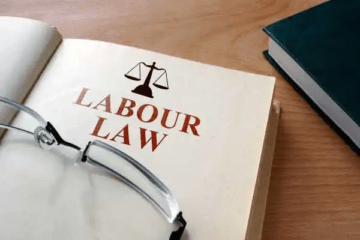
This article is written by Harpreet Kaur of 7th Semester of University Institute of Legal Studies, Panjab University, Chandigarh
Abstract
Strikes and lockouts are powerful weapons in the hands of employees and employers respectively, in relation to the working conditions of a particular industry. In order to work out solutions to employment-related conflicts between the employers and employees of a particular industry, these tools are often put to use. The use of these tools has proved instrumental in the history of conventional industry. However, certain specific circumstances make these strikes and lockouts illegal, and further, also make the persons involved, liable to penalties. These illegal strikes and lockouts patently go against the public policy of the state, enshrined in the Industrial Disputes Act, of 1947, and thus, have expressly been defined and made punishable therein.
Keywords
Strike, Lock-out, Industry, Dispute, Employee, Employer, Illegal Strikes, Illegal Lock-outs, Prohibition, General prohibition of Strikes and Lock-outs, Penalties, Instigation, Financial Aid, Industrial Disputes Act, 1947, Trade Disputes Act, 1929
Objectives
This article has been formulated to look into the concept of strikes and lock-outs, their definitions and significance in Industrial Law, Provisions relating to strikes and lock-outs in the Industrial Disputes Act, 1947, General Prohibition of Strikes and Lockouts, most importantly, the Penalties prescribes by the abovementioned statute for illegal strikes and lock-outs, and some landmark decisions of the apex court dealing with these matters.
Introduction
For any industrial endeavour to be productive and profitable, an essential requirement is the smooth co-operation of labour and capital. However, these two, while coinciding in their work on one hand, are often opposed to each other, in regards to their interests. In situations where this misalignment in interest turns into an overt conflict, instruments like strikes and lockouts become significant in their effects on decision-making. In a functioning industry, adverse effects will inevitably be seen if the workers collectively cease to work unless some condition is fulfilled, or if the employer completely denies the workers the opportunity to the workers for some reason. The discussion on Industry Law, therefore, can never be complete unless the factors of strikes and lockouts are discussed and remedies are provided in case these presentations of dissent turn out to be illegal. Indian Parliamentary Law has taken this point into consideration and has included the provision relating to these circumstances in the Industrial Disputes Act, 1947.
Chapter V of the abovementioned statute is the primary provision relating to strikes and lockouts in industries, factories, companies, etc. It also lays down the law to deal with illegal strikes and lockouts, provisions for their prohibition, and also, with financial aid given to these strikes and lockouts. Chapter VI further embodies the penalties set up for the violation of the abovementioned provisions.
‘Strike’
A strike is a coercive weapon used by the labour to force employers to kneel to their demands or conditions by collectively quitting work. The concept of strike has been around for a long time. In general terms, a strike is as powerful as it is, owing to its pressurising ability to bring about an effective and expeditious readjustment in the conditions of work in the industry concerned. Definitions of the term strike are varied depending upon the circumstances and time of usage. However, it has been expressly defined in the Industrial Disputes Act, 1947.
Section 2(q) of the act defines ‘strike’ as,
‘A cessation of work by a body of persons employed in any industry acting in combination or a concerned refusal, or a refusal under a common understanding, of any number of persons who are or have been so employed to continue to work or to accept employment’
This definition brings out the following essential elements of a strike:
- There must be a cessation of work,
- The cessation must be effectuated by a body of persons,
- This body of persons must be employed in an industry,
- The industry must be such within the meaning of Section 2 (j) of the act,
- The body of persons must be acting in
- Combination, or
- A concerned refusal, or
- A refusal under a common understanding of any number of persons.
- Such body must be consisting of any number of persons who are or have been so employed to continue to work or to accept employment.
LOCKOUT
A lockout, in general terms, is defined as a temporary stoppage of the work by the employer, by means of ‘locking out’ workers from their usual course of employment in order to coerce them into acceding to the employer’s demands or to bring them in line with changes in the terms of their employment. Lock-outs have been used by employers for centuries, to command obedience from the employees.
These were originally utilised during the advent of the industrial revolution when trade unions began to formulate. Employers would temporarily ‘lock’ workers out of their jobs to make them agree to the condition that they would not enter into any such trade unions, and the workers had to agree as otherwise, they could be permanently deprived from their employment and as a result, their livelihoods.
In a similar manner to the term ‘strike,’ the term ‘lock-out’ has also been defined in various ways, and in various contexts and time frames. According to scholars, the proper definition of the term was given in The Trade Disputes Act, 1929.
Section 2(e) of the aforementioned act went as follows,
” lock-out ” means the closing of a place of employment, or the suspension of work, or the refusal by an employer to continue to employ any number of persons employed by him, where such closing, suspension or refusal occurs in consequence of a dispute and is intended for the purpose of compelling those persons, or of aiding another employer in compelling persons employed by him, to accept terms or conditions of or affecting employment.
The current definition i.e., the one provided under The Industrial Disputes Act, 1947 is a watered-down version of the abovementioned definition.
The definition provided under Section 2(l) of the IDA is as follows:
“lock-out” means
- the temporary closing of a place of employment, or
- the suspension of work, or
- the refusal by an employer to continue to employ any number of persons employed by him.
When does a strike or a lockout become illegal?
- Section 22 of the IDA, 1947 lays down the following provisions in relation to strikes carried out by person(s) employed in a public utility service,
(1) No person employed in a public utility service shall go on strike in breach of contract—
(a) without giving to the employer notice of strike, as hereinafter provided, within six weeks before striking; or
(b) within fourteen days of giving such notice; or
(c) before the expiry of the date of strike specified in any such notice as aforesaid; or
(d) during the pendency of any conciliation proceedings before a conciliation officer and seven days after the conclusion of such proceedings.
Further, the section also says that the persons conducting such strike are to give notice to such person(s) as may be prescribed. In turn, those persons are to give notice of such strike to the appropriate government.
-Exception-
An exception is also provided in Sub-section (3), that there is no requirement for such notice by the striking persons if a strike is already in place. However, the notice of such strike is to be given by the authorities to the appropriate government regardless.
-In relation to Lockouts, the Section says,
“(2) No employer carrying on any public utility service shall lock-out any of his workmen—
(a) without giving them notice of lock-out as hereinafter provided, within six weeks before locking out; or
(b) within fourteen days of giving such notice; or
(c) before the expiry the date of lock-out specified in any such notice as aforesaid; or
(d) during the pendency of any conciliation proceedings before a conciliation officer and seven days after the conclusion of such proceedings.”
- Section 23 further lays down ‘General Prohibition of Strikes and Lockouts’.
In express terms prohibiting certain types of strikes and lock-outs, it says,
“No workman who is employed in any industrial establishment shall go on strike in breach of contract and no employer of any such workman shall declare a lock-out–
(a) during the pendency of conciliation proceedings before a Board and seven days after the conclusion of such proceedings;
(b) during the pendency of proceedings before a Labour Court, Tribunal or National Tribunal and two months after the conclusion of such proceedings;
(bb) during the pendency of arbitration proceedings before an arbitrator and two months after the conclusion of such proceedings, where a notification has been issued under sub-section (3A) of section 10A; or
(c) during any period in which a settlement or award is in operation, in respect of any of the matters covered by the settlement or award.”
- Section 23 consolidates the provisions declaring circumstances where a strike or a lock-out is illegal. It states,
“(1) A strike or a lock-out shall be illegal if-
- it is commenced or declared in contravention of section 22 or section 23; or
- it is continued in contravention of an order made under sub-section (3) of section 10 (prohibition by the appropriate government, of strikes and lock-outs in relation to a dispute that has been referred to a Labour Court, Tribunal, or National Tribunal), or sub-section (4A) of section 10A (prohibition by the appropriate government, of strikes and lock-outs in relation to a dispute that has been referred to arbitration).
(3) A lock-out declared in consequence of an illegal strike or a strike declared in consequence of an illegal lock-out shall not be deemed to be illegal.”
-Exception-
Sub-Section (2) lays down an exception to the rule by stating that the continuance of any strike or lock-out, which was already in existence, after the dispute is referred to arbitration or to Labour Court, Tribunal, or National Tribunal shall not, be deemed to be illegal provided that such continuance was not already illegal by virtue of Section 10(3) or Section 10A(4A).
Penalties for Illegal Strikes and Lock-outs
Chapter VI of the Industrial Disputes Act, 1947 specifically deals with the penalties for illegal strikes and lockouts. In order to give teeth to the provisions of Chapter V, the provisions of Chapter VI have been enacted. These provide sanctions for the violations of the provisions discussed earlier i.e., Penalty for persons involved in conducting illegal strikes or lock-outs (Section 26), Penalty for instigation, incitement etc. (Section 27), and Penalty for providing financial aid to such strike or lock-out (Section 28).
- Section 26 lays down the penalties as such,
-For illegal Strikes,
Any workman who commences, continues, or otherwise acts in furtherance of, a strike which is illegal under this Act, shall be punishable with imprisonment for a term which may extend to one month, or with fine which may extend to fifty rupees, or with both.
–For illegal Lock-outs,
Any employer who commences, continues, or otherwise acts in furtherance of a lock-out which is illegal under this Act, shall be punishable with imprisonment for a term which may extend to one month, or with fine which may extend to one thousand rupees, or with both.
- Section 27 in relation to incitement, instigation etc., of such illegal strikes and lock-outs lays down,
Any person who instigates or incites others to take part in, or otherwise acts in furtherance of, a strike or lock-out which is illegal under this Act, shall be punishable with imprisonment for a term which may extend to six months, or with fine which may extend to one thousand rupees, or with both.
- Section 28 lays down penalty for giving financial aid for illegal strikes or lock-outs as follows,
Any person who knowingly expends or applies any money in direct furtherance or support of any illegal strike or lock-out shall be punishable with imprisonment for a term which may extend to six months, or with fine which may extend to one thousand rupees, or with both.
Landmark Judgments relating to illegal Strikes and Lockouts:
The Hon’ble Apex Court held that if the employees do not refrain from work in pursuance of a common intention, such omission of work shall not be considered to be a ‘strike’ in the eyes of the law.
It was held by the Supreme Court that the Right to Conduct a Strike is not inherently included within the Right to Freedom of Speech and Expression enshrined under Article 19 of the Constitution of India.
It was held by the Apex Court that no inherent, or fundamental, or equitable, or legal right bestowed upon government employees to halt work in form of a strike, even for a just and reasonable cause.
- The Punjab National Bank, Ltd. v. Its Workmen[4]
It was held that a ‘Pen-Down’ strike (mostly effectuated in white collar jobs where workers refuse to work with their pens or usual tools of work), was a strike within the meaning annexed to it by The Industrial Disputes Act, 1947.
Conclusion
As it is evidently clear, that instruments of strikes and lock-outs are significant in the study of both industrial relations and industrial law. The statutory framework relating to industries in India recognises the circumstances where these tools may be utilised by the workers and the employers and thus provides for circumstances where they can be legally conducted. In addition to this, it also lays down the conditions, violation of which would make a strike or a lock-out illegal and punishable. Further, it also lays down the respective punishments to the carrying out of illegal strikes and lock-outs and surrounding offences.
- References:
- ‘Penalty for illegal strikes and lock-outs’ https://www.indiacode.nic.in/show-data?actid=AC_CEN_6_6_00039_194714_1517807328510§ionId=24368§ionno=26&orderno=62#:~:text=India%20Code%3A%20Section%20Details&text=(1)%20Any%20workman%20who%20commences,fifty%20rupees%2C%20or%20with%20both. Retrieved: 14.06.2023
- ‘Strikes and Lockouts’ https://blog.ipleaders.in/need-know-strikes-lockouts/ Retrieved: 14.06.2023
- ‘Penalties for Instigation’ https://www.linkedin.com/pulse/penalty-illegal-strike-lock-out-instigating-tfcbangladesh/ Retrieved: 15.06.2023
- ‘Strikes and Lockouts’ https://www.legalserviceindia.com/article/l455-Strikes-and-Lockouts.html Retrieved: 15.06.2023
- ‘Difference between a strike and a lock-out’ https://legalstudymaterial.com/strike-and-lockout/#:~:text=In%20the%20struggle%20between%20the,to%20place%20in%20the%20industry. Retrieved: 14.06.2023
- Industrial Disputes Act. 1947 (Bare Act) https://www.indiacode.nic.in/bitstream/123456789/17112/1/the_industrial_disputes_act.pdf Retrieved: 13.06.2023
- Trade Disputes Act, 1929 https://www.indiacode.nic.in/repealed-act/repealed_act_documents/A1929-7.pdf Retrieved: 13.06.2023
[1] AIR 1953 SCR 219
[2] 1962 AIR 171
[3] (2003) 6 SCC 581
[4] 1960 SCR (1) 806




0 Comments